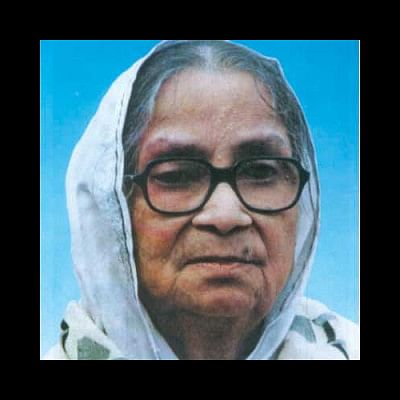Nation celebrates Sufia Kamal's birth anniversary today

Janani Shahashika, the courageous mother -- that is how Bangalees remember poet and activist Begum Sufia Kamal, known for her calm, resolute and dignified stance on social, political, cultural issues in face of intimidation.
Today the nation will celebrate the 105th birth anniversary of the poet, who not only pioneered the women's rights movement in the country but led many cultural and political campaigns.
Born to a conservative Muslim zamindar family in Barisal on June 20, 1911, Sufia did not a obtain formal education, yet she learned Bangla and English along with Hindi, Urdu, Persian, Arabic and Kurdish from her house tutor.
Sufia Kamal's entry into the world of literature took place when she moved to Kolkata after her marriage in 1923. The vibrant literary atmosphere of the city inspired her to write, and in 1923 her first short story "Sainik Bandhu" (Soldier Bride) was published in a magazine in Barisal. In 1926, her first poem "Bashanti" (Spring) was published by Saogat's editor Muhammad Nasiruddin. In 1938, her first book of poems, Sanjher Maya (The Eventide Spell), was published from Kolkata. Sufia's poetry received acclaim from Bangla literary maestros including Kazi Nazrul Islam and Rabindranath Tagore. However, the poet is known more for her role in movements, including the cultural fight against the West Pakistani regime in the 1960s, when Rabindra Sangeet was banned by the then government. During the mass uprising in 1969, which demanded the resignation of General Ayub Khan, she promoted the cause by forming Mohila Sangram Parishad (Women's Struggle Group). The organisation later became Bangladesh Mahila Parishad, the leading women's rights body in the country.
Despite threats from the Pakistani military forces, during the Liberation War of Bangladesh, Sufia continued to help the freedom fighters with medicine and other supplies from her house in Dhanmondi. In independent Bangladesh, she joined hands with Jahanara Imam, mother of martyr guerrilla freedom fighter Rumi, and called for the trial of the war criminals of 1971.
Sufia also was the founding chairperson of many organisations including Bangladesh Women's Rehabilitation Board, formed right after liberation, Bangladesh Rural Advancement Committee, Dustha Punarbasan Sangstha (Organisation for the Rehabilitation of the Destitute). She was the president of Chhayanaut, a major cultural organisation, Bangladesh Protibondhi Foundation, a foundation for the treatment, education and rehabilitation of the people with disabilities, and Nari Kalyan Sangstha.
Sufia Kamal received nearly 50 major awards including the Bangla Academy Award for Literature (1962), Ekushey Padak (1976), Begum Rokeya Padak (1996), and Independence Day Award (1997). She also received a number of international awards. Sufia Kamal continued to be a source of inspiration even after her death at the age of 88 on November 20, 1999.
Many cultural and rights organisations including Bangladesh Mahila Parishad and Sufia Kamal Sangskriti Prangyan will hold special programmes today, remembering her contributions.

 For all latest news, follow The Daily Star's Google News channel.
For all latest news, follow The Daily Star's Google News channel. 



Comments